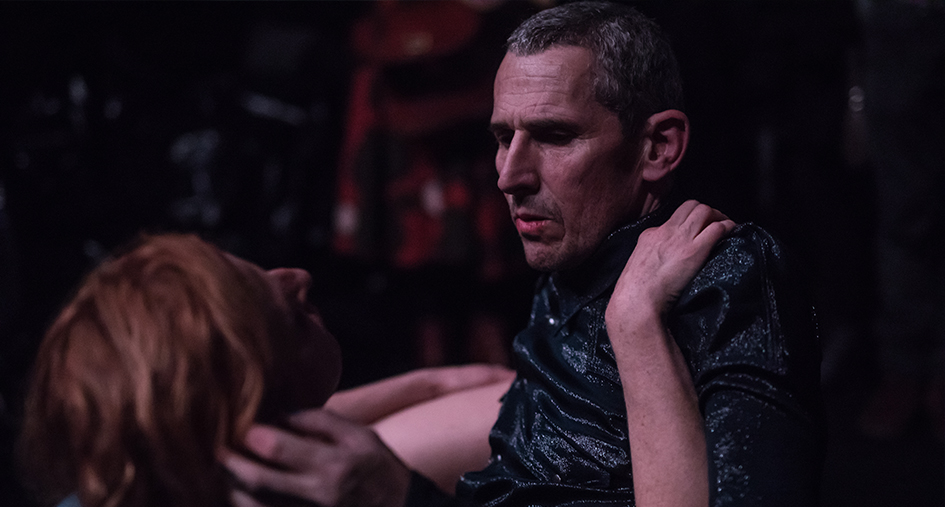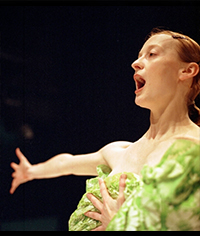
JUANA
L'animal a l'esquena (Celrà)
From 08/03/2023 to 18/03/2023
La Ribot Ensemble
( La Ribot Ensemble )

L'animal a l'esquena (Celrà)
From 08/03/2023 to 18/03/2023
La Ribot Ensemble
( La Ribot Ensemble )

Thirty years after the premiere of El Triste Que Nunca Os Vido, La Ribot returns to the controversial figure of Juana I de Castilla in collaboration with the Spanish conductor and composer Asier Puga. This new proposal is based on a dialogue between La Ribot’s iconoclastic dance and the music composed by Asier Puga, inspired by the Cancionero of Juana I de Castilla.
At a time of global transformation, world pandemics, climate change that affect all territories, but also women’s liberation movements of unprecedented scale, La Ribot returns to the figure of Juana. She continues to embody a resistance, albeit impeded, to Western patriarchal oppression and its filial and matrimonial institutions. In this new approach, the idea of the couple is maintained, declined, transformed, destroyed, and questioned. The dancers will be accompanied by soloists from OCAZEnigma. The relentless movement of the setting sun will signify the eternal repetition, without escape, of Juana’s almost 16,000 days of confinement.
At a time of global transformation, world pandemics, climate change that affect all territories, but also women’s liberation movements of unprecedented scale, La Ribot returns to the figure of Juana. She continues to embody a resistance, albeit impeded, to Western patriarchal oppression and its filial and matrimonial institutions. In this new approach, the idea of the couple is maintained, declined, transformed, destroyed, and questioned. The dancers will be accompanied by soloists from OCAZEnigma. The relentless movement of the setting sun will signify the eternal repetition, without escape, of Juana’s almost 16,000 days of confinement.
Asier Puga will compose the original music from the Cancionero, the songbook given to Juana I de Castilla and Philip The Handsome on their wedding day. The soloists from the Zaragoza Auditorium Chamber Orchestra, one of the most renowned ensembles in the field of 20th century and contemporary music in Spain, conducted by Asier Puga, will draw inspiration from the works of Juan del Encina, Antonio de Cabezón and Cristóbal de Morales, among others. The music composed at the time and in the context of Juana I de Castilla will be presented in its original structure, adapted or filtered with contemporary and electronic techniques.
Juana I de Castilla (1479-1555) was imprisoned in a palace in Tordesillas after the death of her husband Philip the Handsome, with the support of her parents, the Catholic Kings, and later her son, Charles V. Considered insane, the legitimate Queen of Spain remained locked up for 46 years, away from power. The Romantic vision of madness, expressed in famous paintings such as Francisco Pradilla’s Doña Juana La Loca (1877), helped establish the idea of Juana I de Castilla’s supposed madness in the collective imagination. In recent years, studies have contradicted this version of events and have shown that the real cause of her imprisonment was a political strategy aimed at removing her from any position of power. As Michel Foucault argued in his History of Madness, madness is a social construct, whose raison d’être lies in opposition to the established order.
At the same time, Europe was going through a period of profound scientific and political upheaval. Three major discoveries marked the Spanish Golden Age and Renaissance Europe. Breakthroughs in medicine brought a new understanding of the functioning of the human body. The great colonial expeditions confirmed that the Earth was round. Science demonstrated that it is the Earth that revolves around the sun, contrary to the geocentric theory that had been prevalent until then. These discoveries radically changed the perception of humanity, the Earth and their respective places in the cosmos.
In 1991, coinciding with the commemoration of the fifth centenary of the arrival of Christopher Columbus in the New World and the celebration of this predominantly masculine history, La Ribot created El Triste Que Nunca Os Vido, a duet for a woman and a man inspired by the life of Juana I de Castilla, which she performed with the actor Juan Loriente.
Choreography and interpretation: La Ribot and Juan Loriente
Composer and conductor: Asier Puga
With OCAZEnigma - Zaragoza Auditorium Chamber Orchestra
Dramaturgy: Jaime Conde Salazar
Costumes: La Ribot and Marion Schmid
Executive producer: Aude Martino
Production and communication assistant: Iris Obadia
Technical director: Marie Prédour
Administrator: Gonzague Bochud
Production: La Ribot Ensemble
La Ribot Ensemble has received support for the transformation projects of the Canton and Republic of Geneva in 2021 and 2022.
La Ribot Ensemble is subsidised by the City of Geneva and the Canton of Geneva, and with the support of Pro Helvetia, Swiss Arts Council.
Juana I de Castilla (1479-1555) was imprisoned in a palace in Tordesillas after the death of her husband Philip the Handsome, with the support of her parents, the Catholic Kings, and later her son, Charles V. Considered insane, the legitimate Queen of Spain remained locked up for 46 years, away from power. The Romantic vision of madness, expressed in famous paintings such as Francisco Pradilla’s Doña Juana La Loca (1877), helped establish the idea of Juana I de Castilla’s supposed madness in the collective imagination. In recent years, studies have contradicted this version of events and have shown that the real cause of her imprisonment was a political strategy aimed at removing her from any position of power. As Michel Foucault argued in his History of Madness, madness is a social construct, whose raison d’être lies in opposition to the established order.
At the same time, Europe was going through a period of profound scientific and political upheaval. Three major discoveries marked the Spanish Golden Age and Renaissance Europe. Breakthroughs in medicine brought a new understanding of the functioning of the human body. The great colonial expeditions confirmed that the Earth was round. Science demonstrated that it is the Earth that revolves around the sun, contrary to the geocentric theory that had been prevalent until then. These discoveries radically changed the perception of humanity, the Earth and their respective places in the cosmos.
In 1991, coinciding with the commemoration of the fifth centenary of the arrival of Christopher Columbus in the New World and the celebration of this predominantly masculine history, La Ribot created El Triste Que Nunca Os Vido, a duet for a woman and a man inspired by the life of Juana I de Castilla, which she performed with the actor Juan Loriente.
Choreography and interpretation: La Ribot and Juan Loriente
Composer and conductor: Asier Puga
With OCAZEnigma - Zaragoza Auditorium Chamber Orchestra
Dramaturgy: Jaime Conde Salazar
Costumes: La Ribot and Marion Schmid
Executive producer: Aude Martino
Production and communication assistant: Iris Obadia
Technical director: Marie Prédour
Administrator: Gonzague Bochud
Production: La Ribot Ensemble
La Ribot Ensemble has received support for the transformation projects of the Canton and Republic of Geneva in 2021 and 2022.
La Ribot Ensemble is subsidised by the City of Geneva and the Canton of Geneva, and with the support of Pro Helvetia, Swiss Arts Council.
